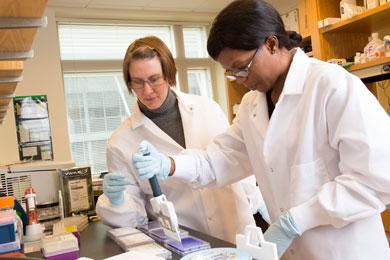UMB Enters Five-Year, $6 Million Partnership with MedImmune
New collaboration will strengthen SOP’s existing relationship with biopharmaceutical powerhouse and drive novel bioscience research across the State of Maryland and beyond.

By Malissa Carroll
March 24, 2014
The University of Maryland, Baltimore (UMB) recently announced that it will enter into a five-year, $6 million collaboration with MedImmune, the global biologics research and development arm of pharmaceutical giant AstraZeneca, to advance bioscience research and innovation across the state of Maryland and beyond. One of six professional schools at UMB, the University of Maryland School of Pharmacy has a long-established relationship with MedImmune, which will continue to grow through the increase in joint research projects, scientific exchange, and educational training opportunities afforded by this partnership.
“The University’s partnership with MedImmune aligns with the School of Pharmacy’s strategic emphasis on developing entrepreneurial initiatives to better impact human health,” says Natalie D. Eddington, PhD, FAAPS, FCP, dean and professor of the School of Pharmacy. “The partnership provides an opportunity to take our new discoveries and technologies out of the lab and into a collaborative environment with MedImmune’s scientists and researchers, with the goal of more quickly moving them to the bedside.”
With funding from MedImmune, UMB, and the BioMaryland Center – part of Maryland’s Department of Business and Economic Development (DBED) – this partnership represents a unique model to foster and support innovation in Maryland.
Collaborative research projects between MedImmune and faculty, students, and post-doctoral fellows at the School of Pharmacy will focus on MedImmune’s core therapeutic areas, including cardiovascular and metabolic disease, antibody development and protein engineering, oncology, respiratory disease, inflammation, and autoimmunity, and infectious disease.
“With the launch of our post-graduate Doctor of Pharmacy (PharmD) fellowship in clinical sciences at MedImmune in 2008, the School of Pharmacy cemented its relationship with MedImmune,” says Peter Swaan, PhD, associate dean for research and graduate studies and professor in the Department of Pharmaceutical Sciences (PSC) at the School of Pharmacy. “Since that time, MedImmune has continued to experience incredible growth, and I am confident that our interactions with this local biotechnology powerhouse will only increase.”
He adds, “This new collaboration will not only provide great opportunities for faculty at the School of Pharmacy who wish to partner on joint research projects, but also for our students, who will benefit from additional internships and mentorship under some of the company’s leading scientists.”
Following the announcement of this partnership, MedImmune received more than 40 grant proposals from researchers across UMB. Applications are still under review at this time, with MedImmune promising to contribute at least $5 million to support five selected proposals – one from each of its core therapeutic areas – and UM contributing $1 million over the five-year partnership. DBED will also provide financial support to the collaboration under its commitment to stimulate economic development in the state. Its contribution will be based on available funding.
“MedImmune is committed to growing Maryland’s bioscience cluster,” says Bahija Jallal, PhD, executive vice president of MedImmune. “In 2013, our site in Gaithersburg was designated as one of three global research and development centers for AstraZeneca, and this collaboration with UMB is a great example of leveraging our local ecosystem to partner with a premier research institution in our own backyard. We are excited about the opportunity to work with UMB, as it will enable us to initiate innovative research that may ultimately result in new medicines that will help treat patients with a variety of serious diseases.”
The University of Maryland, College Park and the University of Maryland, Baltimore County will also be integral members of this collaboration.

